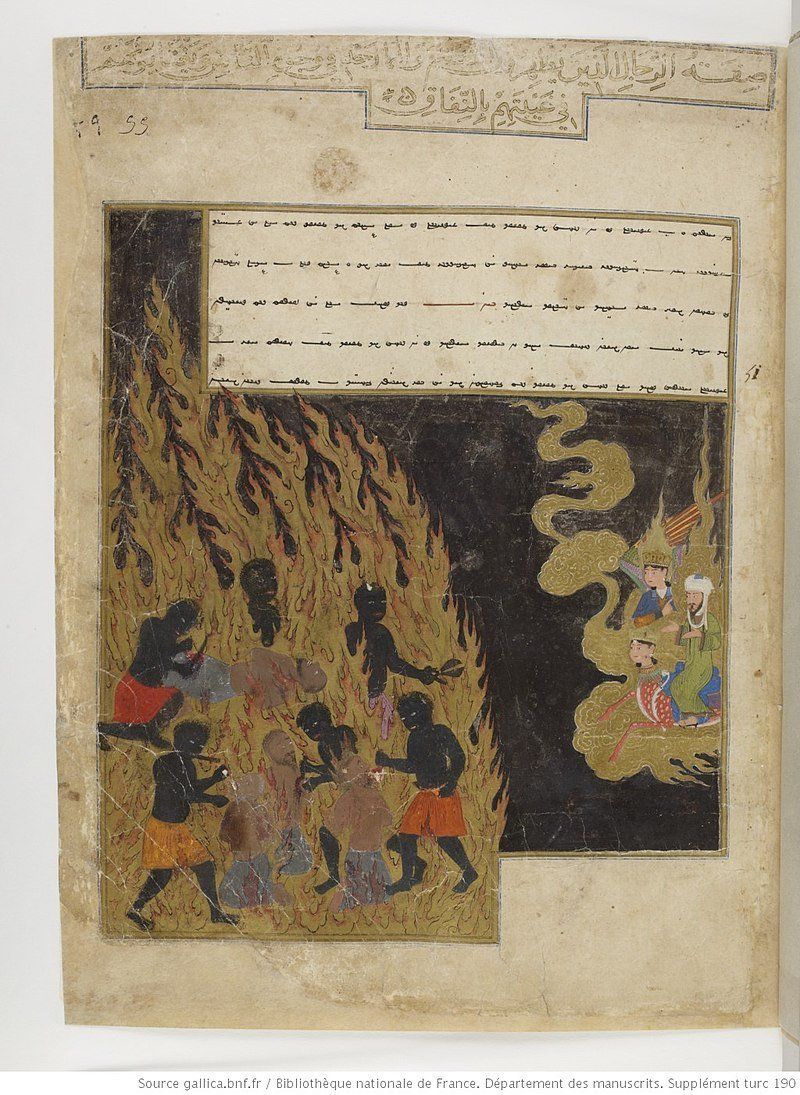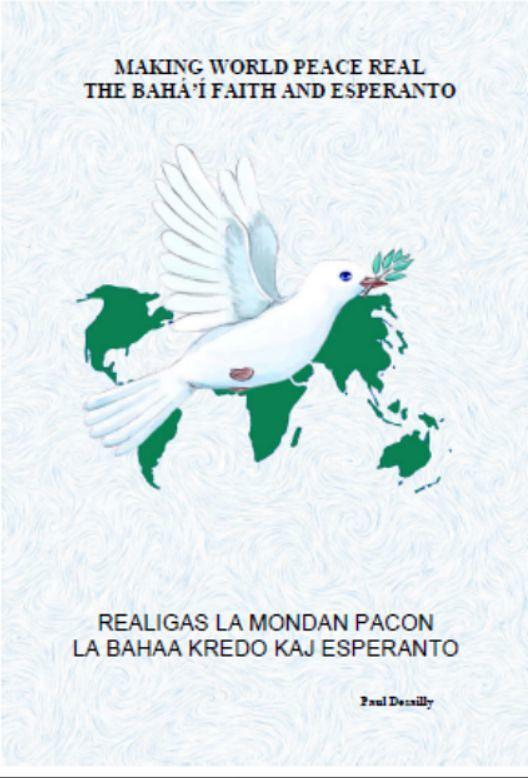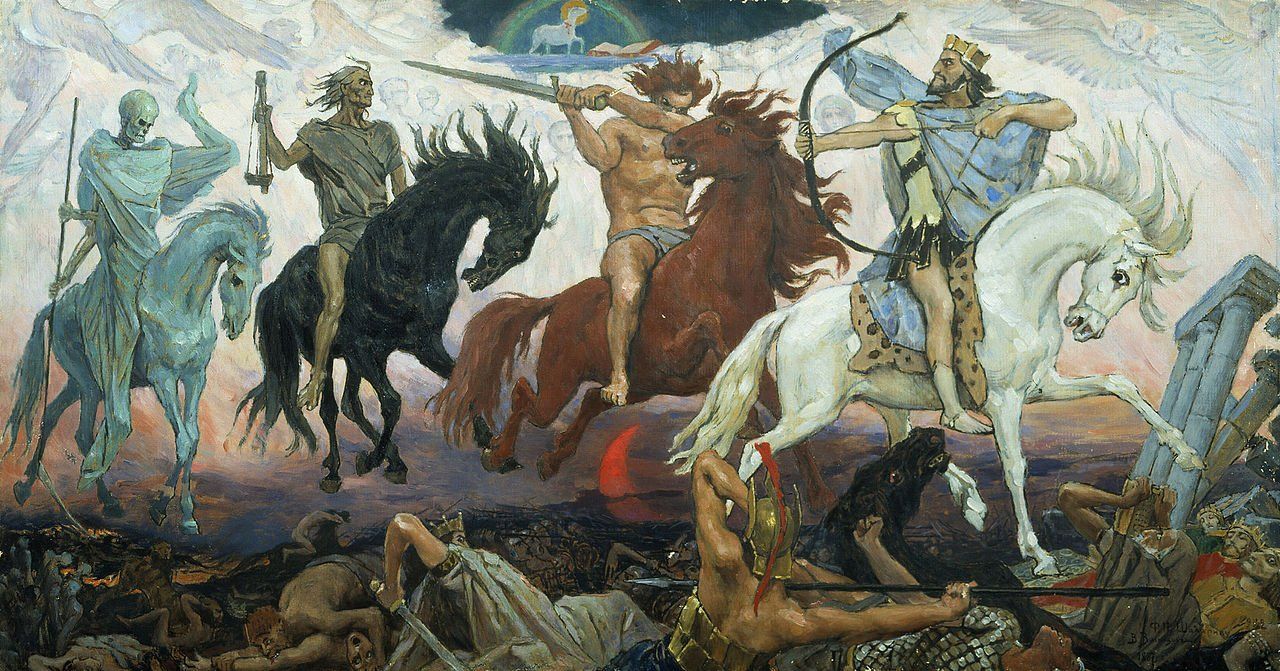HYPOCRISY IN RELIGION
HIPOKRITECO EN RELIGIO. KIAL?
HYPOCRISY IN RELIGION. WHY IS IT SO?
Paŭlo (ne la Apostolo) Desailly (PD) Paul (not the Apostle) Desailly (PD)
EN 1890 BAHA’U’LLAH JAM ESTIS ESPERANTISTO
jam temp' está - por forigi hipokritecon en religio
https://www.bandeeducation.com/baha-u-llah-was-an-esperantist
IN 1890 BAHA’U’LLAH ALREADY WAS AN ESPERANTIST
it’s about time – to end hypocrisy in religion!

La puno por hipokrituloj (tranĉado de karno), persa miniaturo
The punishment for hypocrites (cutting of flesh), Persian miniature.
-----------------------------------------------------
NE EVITU VIAN RESPONDECON
Abdul Baha kaj Shoghi Effendi esperantistiĝis
PASSING THE BUCK?
Abdul Baha and Shoghi Effendi were Esperantists
“Tempo jam estas”, en 1985 kaj 1986, verkis Hajfa en la imperativo kaj la superlativo, por konsulti larĝe pri la principo de universala helplingvo. Ripetfoje, antaŭ, dum, kaj post la intermilitaj jaroj, Abdul Baha kaj Shoghi Effendi instrukciis ĉiujn bahaanojn studi kaj disvastigi “ĉi tiun facilan lingvon”, Esperanton. La institucia instrukcio en La Promeso de Monda Paco, obeenda de ĉiuj bahaanoj, deklaras ke la lingva principo en si mem "postulas la plej urĝan priatenton", do estu prikonsultata, ne necese tuj elektata, de ĉiuj bahaaj estroj vortigantaj tiajn deklarojn. Alikaze, ankoraŭfoje, perceptata de la publiko, kiel naŭza estas la hipokriteco de influhavaj unuopuloj en religiaj organizoj, kies vortoj en la realo signifas "veladon sub falsaj flagoj". Vidu aludon ĉe hipokriteco en letero de la Universala Domo de Justeco al BEL, 6 okt-o 1976.
"Fundamenta manko de interkomunikado inter popoloj serioze subfosas la strebon al monda paco. Adopto de internacia helplingvo grandparte kontribuos al la solvo de tiu ĉi problemo kaj postulas la plej urĝan priatenton." La Universala Domo de Justeco, 1985.
Senkonscie ignorata de bahaa akademianaro: https://www.bandeeducation.com/la-principo-de-universala-help-lingvo katalogo.uea.org/katalogo.php?inf=3009&id=1688&recenzo=montru Plej Granda Rimedo por antaŭenigi harmonion kaj civilizacion, La
Back in 1985 and 1986 it was already time, Haifa said in the imperative and the superlative, to consult far and wide on the principle of a universal auxiliary language. Over and over, before, during and after the interbellum, Abdul Baha and Shoghi Effendi instructed all Baha’is to study and disseminate “this easy language”, Esperanto. Institutional guidance in The Promise of World Peace as to the language principle per se "necessitating the most urgent attention" must be seen to be practised by all Baha’i leaders who frame such statements. If not, prevailing again in religion is a public perception of hypocrisy perpetrated by influential individuals in religious organizations whose words signify to “sail under false colors”.☹ See a false colors allusion to hypocrisy in the House’s 6 October 1976 letter to Bahaa Esperanto-Ligo. https://www.bandeeducation.com/an-ignoble-scandal-1974 https://www.bandeeducation.com/malhonora-skandalo-1974
“A fundamental lack of communication between peoples seriously undermines efforts towards world peace. Adopting an international auxiliary language would go far to resolving this problem and necessitates the most urgent attention.” The Universal House of Justice, 1985. https://en.wikipedia.org/wiki/The_Promise_of_World_Peace https://www.bahai.org/documents/the-universal-house-of-justice/promise-world-peace (part II)
Unconscionably ignored by Baha’i academia: https://www.bandeeducation.com/the-principle-of-a-universal-auxiliary-language
‘La personon de Abdul Baha kaj lian laboradon mi tre alte estimas: mi vidas en li unu el la plej grandaj bonfarantoj de la homaro.’ L. L. Zamenhof
‘The personage of Abdul Baha and his work I very highly esteem: I see in him one of the greatest benefactors of mankind.’ Dr. L. L. Zamenhof
ĉiuj el ni devas esti kontentaj kaj dankemaj al li por lia nobla penado [Esperanto] ĉar tiumaniere li faris bonan servon al siaj proksimuloj.’ Abdul Baha
’All of us must be grateful and thankful to him [LLZ] for this noble effort [Esperanto]; for in this way he has served his fellowmen well.’ Abdul Baha
Ke Baha’u’llah promociis Esperanton je la sojlo de Sia forpaso estas preterlasite de bahaa akademiano C. Buck (Pitsburgo) kaj Profesoro Y. Ioannesyan (Sankta Peterburgo, Rusio.)
“Unu tagon, [PD: 1863, kiam Ludoviko havis kvar jarojn] en Konstantinopolo, Kamal Paŝao [PD: altranga ŝtatministro en la otomana kortego de sultano Abdul Azíz (1830–1876, en ofico: 1861–1876, abdikis la 30-an de majo, murdita kvin tagojn poste)] vizitis ĉi tiun Persekutiton [Baha’u’llah]. Nia konversacio temis al temoj profitodonaj al la homaro. Li diris, ke li lernis plurajn lingvojn. Responde Ni rimarkis: ‘Vi malŝparis vian vivon. Decas al vi kaj la aliaj altranguloj okazigi kunvenon kaj elekti unu el la diversaj lingvoj, kaj, ankaŭ, unu el la ekzistantaj skriboj aŭ krei novan lingvon kaj novan skribon instruotaj al infanoj tra la mondo. Tiamaniere ili akirus nur du lingvojn, unue sian denaskan lingvon, la alia la lingvon en kiu ĉiuj popoloj de la mondo interparolus. Se homoj firme tenus tion, kio estas menciita, la tutan teron oni konsiderus kiel unu landon, kaj la popoloj estus senŝarĝitaj kaj liberigitaj for de la neceso akiri kaj instrui diversajn lingvojn.’ En Nia ĉeesto li konsentis, kaj eĉ montris grandan ĝojon kaj tutan kontentiĝon. Ni tiam diris al li, meti tiun ĉi aferon antaŭ la altrangulojn kaj ministrojn de la registaro, por ke ĝi efektiviĝu tra la diversaj landoj. Tamen kvankam li ofte revenis por vidi Nin post tio, li neniam refoje aludis al ĉi tiu temo, kvankam tio, kio estis sugestita, kondukas al la konkordo kaj unueco de la popoloj de la mondo.
Ni ja esperas ke la persa registaro adoptos kaj efektivigos ĝin. Nuntempe [1891] nova lingvo kaj nova skribo estas elpensitaj. Se vi deziras, Ni komunikos ilin al vi. Nia celo estas, ke ĉiuj homoj aliĝu al tio, kio malpliigos nenecesajn laboron kaj penon por ke taŭge ili pasigu kaj finu siajn tagojn. Dio vere estas la Helpanto, la Scianto, la Ordonanto, la ĉioscianto.”
Baha’u’llah, The Epistle to the Son of the Wolf (La Epistolo al la Filo de la Lupo.) 1891. Tradukis: Trevor Steele. Kolorigis kaj emfazis la tekston Paul Desailly.
That Baha’u’llah promoted Esperanto on the eve of His passing is omitted by the Baha’i academic Dr. Christopher Buck (Pittsburgh, USA) and Professor Y. Ioannesyan (Saint Petersburg, Russia).
“One day, while in Constantinople, [PD: 1863, when doctor Zamenhof was four years old] Kamál Páshá [PD: a high ranking Minister of State in the Ottoman court of Sultan Abdul Aziz (1830–1876, reigned: 1861–1876, abdicated 30th May, murdered five days later)] visited this Wronged One [Baha’u’llah]. Our conversation turned upon topics profitable unto man. He said that he had learned several languages. In reply We observed ‘You have wasted your life. It beseemeth you and the other officials of the Government to convene a gathering and choose one of the divers languages, and likewise one of the existing scripts, or else to create a new language and a new script to be taught to children in schools throughout the world. In this way, they would be acquiring only two languages, one their own native tongue, the other the language in which all the peoples of the world would converse. Were men to take fast hold on that which hath been mentioned the whole Earth would come to be regarded as one country and the people would be relieved and freed from the necessity of acquiring and teaching different languages.’ When in Our presence he acquiesced, and even evinced great joy and complete satisfaction. We then told him to lay this matter before the officials and Ministers of the government, in order that it might be put into effect throughout the different countries. However, although he often returned to see Us after this, he never again referred to this subject, although that which had been suggested is conducive to the concord and the unity of the peoples of the world.
We fain would hope that the Persian government will adopt it and carry it out. At present, [1891] a new language and a new script have been devised. If thou desirest, We will communicate them to thee. Our purpose is that all men may cleave unto that which will reduce unnecessary labour and exertion, so that their days may be befittingly spent and ended. God, verily, is the Helper, the Knower, the Ordainer, the Omniscient.”
Baha’u’llah, The Epistle to the Son of the Wolf. (Colourizing by P. Desailly.)
Neniu laŭ mia esplorado demandis Lin pri ĉi tiuj nove elpensitaj lingvo kaj skribo. Kategorie, kvankam senfonte en, krom tiu grava manko, grandioza deknaŭpaĝa Antaŭparolo (1953) al la sama Epistolo, Marzieh Gail (1908–1993), kies flueco en la araba, la angla, la franca, la persa kaj la turka estas epopea, koncize deklaras, ke la koncernaj lingvo kaj skribo "neniam estis komunikitaj al iu ajn fare de Baha’u’llah." Unu jaron post eldonado de La Epistolo al la Filo de la Lupo en 1891, Baha’u’llah ĉieleniras, je kiu tempo, jam kiel kvinjara eldonita projekto, Esperanto vaste cirkulas presite en la najbara Carisma imperio kaj el Varsovio disvastiĝas multe pli malproksimen eksterlanden. En Aprilo 1890, kelkajn monatojn antaŭ ol Baha’u’llah skribas, ke "nova lingvo kaj nova skribo estas elpensitaj", la fama Kembriĝa orientalisto Profesoro E. G. Browne * ricevas plurajn aŭdiencojn, dum kiuj la brila kreaĵo de doktoro Zamenhof eble aŭ probable ekzameniĝas. De ĝiaj admirantoj Esperanto estas konata kiel la planita aŭ elpensita lingvo, dum certaj kontraŭuloj mallaŭde referencas tiun planitan lingvon – tiom laŭdatan de Abdul Baha, Shoghi Effendi, diversaj Manoj de la Afero de Dio inkluzive de la bahaa ĉampiono, Martha Root, kaj eĉ de Baha’u’llah mem – kiel la artefaritan lingvon. La poliglota orientalisto d-ro Christopher Buck en Scholar Meets Prophet (Klerulo Renkontas Profeton), 2014, ĝuste prezentas longe la institucian rolon de la Universala Domo de Justeco inaŭgurita multajn jarojn post la forpaso de Browne kaj la koroda influo ĉe li de t.n. Azali-bahaanoj. Bedaŭrinde, tamen, se ni ekkomprenas la skriban takson de Browne donitan al sia rusa korespondanto barono Rosen, kion Baha’u’llah ĉefe transdonis al la angla klerulo plejparte evitas la tamen valorajn analizojn, opiniojn kaj konkludon de Buck:
“Li [Baha’u’llah] parolis plejparte pri la neceso, ke ĉiuj nacioj elektu unu lingvon kiel rimedon de internacia komunikado kaj unu skribon (kvazaŭa prediko pri la fina teksto de Kitáb-i-Aqdas*) kaj pri la neceso forigi militon kaj internacian ĵaluzon kaj malamikecon. Pri doktrinoj en si mem li malmulte parolis.” E. G. Browne en Scholar Meets Prophet (p. 26) de C. Buck.
My research reveals no one asking Him about this newly devised language and script. Categorically, though unsourced, in an otherwise splendid nineteen-page 1953 Introduction to the same Epistle, Marzieh Gail (1908–1993), whose fluency in Arabic, English, French, Persian and Turkish is epic, tersely states that the language and script in question “were never communicated to anyone by Baha’u’llah.” One year after the publishing of The Epistle to the Son of the Wolf in 1891, Baha’u’llah ascends, by which juncture Esperanto, already as a five-year-old published project, circulates widely in print in the neighbouring Czarist empire and from Warsaw spreads much farther abroad. In April 1890, some months before Baha’u’llah writes that “a new language and a new script have been devised”, the renowned Cambridge orientalist Professor E. G. Browne * is granted several audiences during which doctor Zamenhof’s ingenious creation perchance comes under scrutiny. By its admirers, Esperanto is known as the planned or devised language while certain naysayers pejoratively label this planned device – so esteemed by Abdul Baha, Shoghi Effendi, various Hands of the Cause of God including ace titleholder Martha Root and, even by Baha’u’llah himself – as the artificial language. Polyglot orientalist, Christopher Buck (PhD, JD) in Scholar Meets Prophet (2014) correctly depicts at length the institutional role of the Universal House of Justice inaugurated long after Browne’s passing and the Azalis’ corrosive influence over him. Sadly, however, if we apprehend Browne’s written appraisal provided to his Russian correspondent baron Rosen, what Baha’u’llah primarily conveyed to the English scholar largely eludes Buck’s nonetheless valuable analysis, views and Conclusion:
“He [Baha’u’llah] talked for the most part of the necessity of all nations choosing one language as a means of international communication & one writing (a sort of sermon on the concluding text of the Kitáb-i-Aqdas *) & of the necessity of putting down war & international jealousy & hostility. Of doctrine properly so called he spoke little.” E. G. Browne in Buck’s Scholar Meets Prophet, page 26.
* Bilingually on Browne:
https://www.bandeeducation.com/the-baha%E2%80%99i-faith-and-esperanto-a-ticklish-relationship
https://www.youtube.com/watch?v=6jRyfElihjU
https://bahai-library.com/pdf/b/buck_ioannesyan_scholar_prophet.pdf page 26
http://bahaiteachings.org/rising-above-the-self-the-bahai-role-model-abdul-baha
Kion la bahaa akademiano, Buck, kaj profesoro Ioannesyan, kiel kunaŭtoroj de Scholar Meets Prophet taksas kronologie konfuziga en la ripetita respondo de Browne (p32) pri tio, kion Baha’u’llah plejparte transdonis al li en Akko (Israelo), tio konsistigas neniun perplekson por esperantistoj pro tio, ke Esperanto ja aperis en 1887. Laŭ Buck 1887 mistifike aperas en la notoj de Browne:
Browne daŭrigas siajn notojn pri siaj historiaj renkontiĝoj kun la Disendito por nia erao:
“Li [Baha’u’llah] denove insistis tre forte pri la neceso de unueco kaj konkordo inter la nacioj, kaj parolis pri la سلامالأكبر kiu venos baldaŭ (1886–1887) ??? (Browne Sup.21(8), Akko, folio 10.)”
Noto [de Buck kaj Ioannesyan]: “Konsiderante ke la jaro estis 1890, la referenco de Browne al '1886–1887' estas konfuziga. Ĉi tie, Baha’u’llah parolas pri 'La Plej Granda Paco' (ṣulḥ-i akbar), kiu signifas la internacian pacan planon, kiun Baha'u'llah proponis al la politikaj kaj religiaj gvidantoj de la mondo per serio de malfermaj epistoloj, kiel parto de la ĝenerala proklamado de celo kaj enhavo de la profeta celo kaj misio de Baha'u'llah. La plia raporto de Browne jenas:
‘Nepre ekzistu unu lingvo kaj unu skribo - La unua povas esti aŭ lingvo el tiuj nun ekzistantaj, aŭ lingvo elpensita de konferenco de sciuloj de ĉiuj landoj. Ĉiuj nacioj devas kunligi sin por forigi ajnan nacion, kiu provas ĝeni la ĝeneralan pacon.’ “
[Vidu la lastan alineon de p. 31 kaj la unuajn du de p. 32:
Scholar Meets Prophet (Klerulo Renkontas Profeton).]
What Buck, a Baha’i academic, along with Professor Ioannesyan as co-authors of Scholar Meets Prophet find chronologically puzzling about Browne’s restating (p32) of what Baha’u’llah for the most part conveyed to him in Acre (Israel) constitutes zero puzzlement for Esperantists given Esperanto’s advent in 1887. In Buck’s estimation 1887 mystifyingly appears in Browne’s notes:
Browne continues his notes vis-à-vis his historic meetings with the Promised One, Baha’u’llah:
“He [Baha’u’llah] again insisted very strongly on the necessity of unity & concord amongst the nations, & spoke of the سلامالأكبر which will come soon (1886–1887) [sic] ??? (Browne Sup.21(8), Acre,
folio 10.)”
Note [by Buck and Ioannesyan]: “Considering that the year was 1890, Browne’s reference to ‘1886–1887’ is puzzling. Here, Baha’u’llah speaks of ‘The Most Great Peace’ (ṣulḥ-i akbar), which represents the international peace plan that Baha’u’llah offered to the political and religious leaders of the world by way of a series of open epistles, as part of the general proclamation of purpose and nature of Baha’u’llah’s prophetic purpose and mission. Browne’s further account is as follows:
‘There must be one language & one writing – The former may be either one of those now existing, or one invented for the purpose by a conference of savants of all countries. All nations must bind themselves to combine & put down any nation which attempts to disturb the general peace.’ “
See the last paragraph of p 31 and the first two paragraphs of p 32: Scholar Meets Prophet.
Gleanings from the Writings of Baha’u’llah, CXVII, kunligas la internacian helplingvan principon kun ĉio-ampleksa kunvenego, taskita historie realigi la mondan pacon kaj forigi la ŝarĝon de armila produktado: https://bahai-library.com/writings/bahaullah/gwb/117.html
"La Granda Estaĵo, dezirante malkaŝi la postulojn pri paco kaj trankvileco de la mondo kaj la antaŭeniĝo de la popoloj, verkis: Devas alveni tempo, kiam la imperativa neceso, por kunvoki vastan, ĉioentenan kunvenon de homoj estos universale konstatita. La regantoj kaj reĝoj de la Tero devas nepre ĉeesti ĝin kaj partoprenante en ĝiaj interkonsiloj, devas konsideri tiajn vojojn kaj rimedojn, kiuj metos fundamentojn de la Plej Granda Mondpaco inter la homoj. Tia paco postulas, ke la Grandaj Potencoj decidu, pro la trankvileco de la popoloj sur la Tero, ke ili plene akordiĝu inter si. Se iu ajn reĝo prenus armilon kontraŭ alia, ĉiuj devas unuigite leviĝi kaj malebligi tion al li. Se tio estos plenumita, la nacioj de la mondo ne plu bezonos armilojn krom por konservi la sekurecon de siaj regnoj kaj por gardi internan ordon en siaj teritorioj. Tio certigos la pacon kaj trankvilecon de ĉiu popolo, registaro kaj nacio. Ni esperu, ke la reĝoj kaj regantoj de la Tero, la speguloj de la moŝta kaj ĉiopotenca Nomo de Dio plenumos tiun celon, kaj ŝirmos la homaron kontraŭ la torentado de tiraneco... La tago alproksimiĝas, kiam ĉiuj popoloj de la mondo adoptos universalan lingvon kaj komunan skribon. Kiam tio estas atingita, ĉiu homo, kiun ajn urbon li vizitos, kvazaŭ eniros en sian propran domon. Tiuj aferoj estas devigaj kaj nepre necesaj. Ĉiu klarvida kaj saĝa homo devas klopodi starigi tion, kio estas skribita en efektivan agadon..... Tiu vere estas homo, kiu hodiaŭ dediĉas sin al la servo al la tuta homaro. La Granda Estaĵo diris: Benita kaj feliĉa estas tiu, kiu iras antaŭen por akceli la bonon de la homaro. Aliloke proklamis Li: Ne gloru sin tiu, kiu amas sian propran landon, sed tiu, kiu amas la tutan homaron. La Tero estas nur unu lando, kaj ĉiuj homoj ĝiaj civitanoj."
Tr: Lidia Zamenhof, Bahaa Esperanto-Ligo, T Steele, J Dale, P Desailly (El kompilaĵo elektita de Shoghi Effendi, 1935.)
Gleanings from the Writings of Bahá'u'lláh, CXVII comprehensively links the international auxlang principle with an all-embracing assemblage tasked momentously with accomplishing world peace and eliminating the burden of arms production: https://bahai-library.com/writings/bahaullah/gwb/117.html
"The Great Being, wishing to reveal the prerequisites of the peace and tranquillity of the world and the advancement of its peoples, hath written: The time must come when the imperative necessity for the holding of a vast, an all-embracing assemblage of men will be universally realized. The rulers and kings of the earth must needs attend it, and, participating in its deliberations, must consider such ways and means as will lay the foundations of the world’s Great Peace amongst men. Such a peace demandeth that the Great Powers should resolve, for the sake of the tranquillity of the peoples of the earth, to be fully reconciled among themselves. Should any king take up arms against another, all should unitedly arise and prevent him. If this be done, the nations of the world will no longer require any armaments, except for the purpose of preserving the security of their realms and of maintaining internal order within their territories. This will ensure the peace and composure of every people, government and nation. We fain would hope that the kings and rulers of the earth, the mirrors of the gracious and almighty name of God, may attain unto this station, and shield mankind from the onslaught of tyranny…The day is approaching when all the peoples of the world will have adopted one universal language and one common script. When this is achieved, to whatsoever city a man may journey, it shall be as if he were entering his own home. These things are obligatory and absolutely essential. It is incumbent on every man of insight and understanding to strive to translate that which hath been written into reality and action…That one indeed is a man who, today, dedicateth himself to the service of the entire human race. The Great Being saith: Blessed and happy is he that ariseth to promote the best interests of the peoples and kindreds of the earth. In another passage He hath proclaimed: It is not for him to pride himself who loveth his own country, but rather for him who loveth the whole world. The earth is but one country, and mankind its citizens." Baha'u'llah, CXVII.
Gleanings from the Writings of Bahá'u'lláh CXV11. p249 (From a compilation selected by Shoghi Effendi, 1935.)
Kompreni (a) la malakceptitan inviton de Baha'u'llah al profesoro Browne engaĝi Esperanton kaj (b) la tuton de Gleanings CXV11 registritan ĉi tie plene kaj en kontinueco kiel en la angla kaj persa versioj, kaj (c) la ripetajn kaj emfazajn admonojn de Abdul Baha pri Esperanto ŝanĝas ĉion por bahaanoj! La unua parto de Gleanings necesigas ĉio-ampleksan kunsidegon taskitan konsideri praktikajn rimedojn por establi la mondan pacon. Baha’u’llah tiam priskribas, per la kompilaĵo aranĝita de Shoghi Effendi, la fundamenton por atingi pacon. Meze de la sama epistolo Baha’u’llah ŝajnas referenci malkongrue al tute senrilata temo, t.e. universala lingvo. Oni tamen konstatas ke por kunvoki tian historian kunvenon, kies celo estas mondpaco kaj kies membroj ampleksas ĉiujn popolojn, antaŭ-supozata estas alproksimiĝanta lanĉo de aldona kolosa afero, la lingvo-demando! Ajna konsultado aŭ mencio pri Gleanings CXVII en dua eldono de luksa kompilaĵo de profesoro G Meyjes (G Ronald, 2015) estos multe aprezita:
https://www.amazon.com/Greatest-Instrument-Promoting-Harmony-Civilization/dp/085398591X
To grasp (a) the significance of Baha’u’llah’s rejected invitation to Professor Browne to take up Esperanto and to absorb (b) the entirety of Gleanings CXV11, recorded here in full and in continuity as in the English and Farsi versions, and (c) to consult on Abdul Baha’s repeated and emphatic admonitions concerning Esperanto, changes everything for Baha’is! The first part of Gleanings reveals the necessity of an all-embracing assemblage tasked with practical ways to establish world peace. In Shoghi Effendi’s compilation Baha’u’llah then adumbrates the foundation for achieving world peace. At the midpoint of this same epistle the Lord of the Age appears at first to refer incongruously to a completely unrelated topic, i.e. a universal language. One sees though that to convene such an historic meeting, whose aim is world peace and whose members embrace all peoples, presupposes launching an equally colossal issue that is also approaching: the language question! Welcome is any consultation on, or mention of, Gleanings CXVII in a 2nd edition of Prof. G Meyjes’ compilation published by G.
Ronald, 2015: https://www.amazon.com/Greatest-Instrument-Promoting-Harmony-Civilization/dp/085398591X
La Sesa Ishráq (lumego aŭ brilego) proponas internacian helpilon por ĉiu lernejano en la mondo, kaj: "Homo ne fieru pri tio, ke li amas la patrujon, prefere li fieru pri tio, ke li amas siajn kunhomojn." The Sixth Ishráq (Illumination or Effulgence) calls for an international auxlang for every school kid in the world, and: “Let not man glory in this that he loveth his country, let him rather glory in this that he loveth his kind.”
*La lasta paĝo de Kitáb-i-Aqdas de Bahá'u'lláh (paragrafo 189), referencas al lingvo kiel kaŭzo de unueco:
"Ho membroj de la Parlamentoj tra la mondo! Elektu vi unu lingvon por la uzo de ĉiuj surtere kaj adoptu vi same skribon komunan. Dio, vere, igas evidenta al vi, el kio vi profitas kaj ebligos al vi esti sendependaj de aliaj. Li, vere, estas la Plej Malavara, la Ĉio-Scianta, la Ĉio-Konanta. Tio ĉi kaŭzos unuecon, se nur tion kapablus vi kompreni, kaj montriĝos la plej granda ilo por igi antaŭen harmonion kaj civilizacion, ho ke tion vi perceptu! Ni indikis du signojn de la plenkreskiĝo de la homa raso: la unuan, la plej firman fundamenton, Ni skribis sur alian el Niaj Tabuletoj, la dua estas rivelita en tiu ĉi mirinda Libro." Esperantigis: Trevor Steele.
Kaj do, junaj bahaanoj propagandos Esperanton (laŭ rekomendoj de Abdul Baha, Shoghi Effendi kaj la Universala Domo de Justeco!) ĉar novaj scioj pruvas ke Baha’u’llah mem pioniris Esperanton.
*The last page of Baha’u’llah’s Kitáb-i-Aqdas (para. 189), references language as “the cause of unity”:
"O members of Parliaments throughout the world! Select ye a single language for the use of all on Earth, and adopt ye likewise a common script. God, verily, maketh plain for you that which shall profit you and enable you to be independent of others. He, of a truth, is the Most Bountiful, the All-Knowing, the All-Informed. This will be the cause of unity, could ye but comprehend it, and the greatest instrument for promoting harmony and civilization, would that ye might understand! We have appointed two signs for the coming of age of the human race: the first, which is the most firm foundation, We have set down in other of Our Tablets, while the second hath been revealed in this wondrous Book.”
And so, young Baha’is will promote Esperanto as called for by Abdul Baha, Shoghi Effendi and by the House of Justice for new learnings demonstrate that Baha’u’llah himself pioneered Esperanto.
Bahaaj gefratoj! Konsiderante Lian ĉio-sciecon bonvolu ŝpari al ni tian forpuŝon, ke Baha’u’llah ne nepre promociis Esperanton, ĉar Li eble preferis Volapukon, kiu aperis je la mondscenejo malpli ol jardekon antaŭ la debuto de Esperanto en 1887. Volapuko estis populara dum kelka tempo, sed ĝi velkis jardekojn, ĝis la interreto aperis. Nur nesciuloj kaj obskurantoj en bahaismo sugestus, ke Li, la Ĉioscia, pripensis komplikan lingvon de malgrava konsekvenco. La sagaco posedata de Abdul Baha kaj Shoghi Effendi evidentigas sian propran scion, pri kiu lingvo Li celis, al du elstaraj intelektuloj en 1890 kaj 1891. Kaj do, Abdul Baha kaj Shoghi Effendi ofte instrukciis ĉiujn bahaanojn studi Esperanton! 😊😊 Se dedukta rezonado permesus alternativan lingvon, kiun havis en la menso Baha'u'llah, al ni bahaanoj ankoraŭ restas la "ripetaj kaj emfazaj admonoj de Abdul Baha" kaj Shoghi Effendi, ke "ĉiu el ni devas studi ĉi tiun lingvon [t.e. Esperanto] kaj disvastigi ĝin laŭ sia eblo.” Ke hodiaŭ neniu Domano en Hajfa aŭ bahaa Konsilisto ie ajn en la anglofona bahaa komunumo obeas iliajn “ripetajn kaj emfazajn admonojn” pri Esperanto, por diri nenion pri la neglekto de bahaaj akademianoj eĉ por konsulti pri la principo mem, certe malhelpas dissemadon de bahaismo! Imagu la sintenon de influhavaj bahaaj gvidantoj en Aŭstralio. Ili ignoras preskaŭ ĉion supre menciitan kaj elmontras suboptimuman aliron al bahaa ofico: Ĉar dufoje mi protestis kontraŭ skriba aserto, ke mi kritikas nacian bahaan institucion, ili ĉesigas interkonsiliĝon kun ĉi tiu pekulo. Nenio povus esti pli for de la vero ol la aserto, ke mi kritikas la Nacian Spiritan Asembleon, kaj nenio estas pli malbona ol influaj bahaanoj evitantaj la veron kaj bahaan fraton. Ekstreme riproĉinda estas longdaŭra difekto de la koncernaj gvidantoj kiel individuoj ĉar ilia influo, kaj indiferenta aliro al la lingva principo, kaj impertinenta neglekto pri Esperanto, malhelpas junajn bahaanojn kaj malhonoras niajn instituciojn. En tiaj cirkonstancoj kritiki ilin, unuopajn gvidantojn, ne niajn instituciojn, estas absoluta devo de sinceraj sekvantoj de Bahá'u'lláh: BAHAA JUNULARO! MOVU LA MONDON
Pri Abdul Baha: https://sezonoj.ru/2014/01/abdul-baha/ p 14
Baha’i brothers and sisters! Given His omniscience please spare us push back of the ilk that instead of Esperanto Baha’u’llah possibly promoted, for example, Volapük, a planned language which appeared on the world stage shortly before Esperanto's debut in 1887. Volapük, while popular for a while, went on life support for decades until the internet arrived. Only the nescient or obscurantists suggest that He, the Omniscient, had in mind a complicated language of little consequence. The insight possessed by Abdul Baha and Shoghi Effendi bespeaks their inherent and innate knowledge of which language Baha’u’llah wanted two gifted English and Persian intellectuals to investigate in 1890 and 1891. That is why the Master and the Guardian often instructed all Baha’is to study Esperanto! 😊😊 Were deductive reasoning to permit of an alternative language that Baha’u’llah had in mind we Baha’is are still left with the “repeated and emphatic admonitions of Abdul Baha” and Shoghi Effendi that “all of us must study Esperanto and spread it as far as possible”. That no House member or Baha’i Councillor in the Anglophonic Baha’i community follows their instructions about Esperanto, to say nothing of the attitude of Baha’i academics and their reluctance to consult even on the principle itself, surely hinders enrolments! Imagine the mindset of Australian Baha’i leaders who for decades ignore just about everything on the language principle. They exhibit (a chronicled!) underwhelming abuse of office which consists of shunning this sinner for twice protesting the National Spiritual Assembly's written assertion that I criticise Baha’i institutions. Nothing could be further from the truth, and nothing is worse than influential Baha’is shunning the truth and a Baha'i brother. The ingrained culpability of such individuals is reprehensible in that their influence, their silence on the language principle in general, and their impertinent disregard for Esperanto, harms new and young Baha’is, retards growth and dishonours our Baha’i institutions. In such an instance, criticising them as individual leaders, not our institutions, constitutes a duty not to be shirked by informed followers of Baha’u’llah: BAHA'I YOUTH! MOVE THE WORLD: https://www.bandeeducation.com/baha-i-youth-move-the-world-neto
Jam temp’ estas por serioze interkonsiliĝi kun bahaanoj kaj nebahaanoj pri la Esperanto-lingvo, por ke instrukcioj de Abdul Baha kaj Shoghi Effendi pri disvastigado de “ĉi tiu facila lingvo” realiĝu. Jam temp’ estas ke bahaaj gvidantoj mem enkapigu sian urĝan institucian gvidadon pri la lingva principo en i.a. La Promeso de la Monda Paco. Jam temp’ estas por trakti neresponditajn petojn, por pridiskuti ilian nescion aŭ obstinecon: Jam pli ol duonjarcenton abundas bahaaj akademianoj miskomprenantaj (intence?) dekojn da oficialaj leteroj pri la help-lingva principo. Pluraj de Shoghi Effendi verkitaj komenciĝas jene: “Koncerne la temon Esperanto” (4 junio 1937); “Koncerne la instruadon de Esperanto” (26 decembro 1936); “Koncerne vian studadon de Esperanto” (17 aprilo 1936); “Pri la tuta demando de internacia lingvo kaj ĝia rilato al la Kredo” (17 oktobro 1944); “Rilate vian demandon pri la esperantistoj; Dum multaj jaroj ili…” (5 aprilo 1947). # Jam temp’ estas por bahaanoj serioze ekkonsulti kun niaj kun-bahaanoj kaj kun ne-bahaanoj pri la lingva afero substrekita en Artikolo 2 de Universala Deklaracio de Homaj Rajtoj kaj priskribita de Abdu Baha jene: “La plej grava servo al la homaro estos establi ĉi tiun internacian helpkomunikilon.” El egale aŭtoritata fonto, kaj sen referenco al la elekto-demando ĉar tiu tasko apartenas al gravaj institucioj, kongruas la pensoj de Shoghi Effendi kaj Abdul Baha, kiu en aŭtoritata bahaa verko promesas kaj instrukcias: “Per senlaca penado kaj sinoferemo flanke de ĝiaj pioniroj Esperanto fariĝos universala. Tial, ĉiu el ni devas studi ĉi tiun lingvon kaj disvastigi ĝin laŭ sia eblo.” Elangligis Lidia Zamenhof. Pri Abdul Baha: https://sezonoj.ru/2014/01/abdul-baha/ p14 # Registrado inkluzivas kiel usonaj akademianoj ‘korektis’ sekcion de Baha’u’llah kaj la Nova Epoko (p166) pri lingvo (Esperantigita de Lidia Zamenhof) tiel ke iliaj vortoj aperas kiel tiuj de la autoro, Esslemont: https://eo.wikipedia.org/wiki/Bah%C3%A1%27u%27ll%C3%A1h_kaj_la_Nova_Epoko La plej kara amiko de Shoghi Effendi, d-ro John Ebenezer Esslemont, mem por konversacii flue parolis Esperanton.
As to disseminating “this easy language”, to use the Guardian’s descriptor, it’s time for serious consultations on Esperanto so that instructions penned by Abdul Baha and Shoghi Effendi are at least known and understood by the friends. At a minimum, it’s time for Baha’i leaders as individuals to react to urgent institutional guidance on language in, for example, The Promise of World Peace. It’s time to address unanswered requests to discuss their nescience or obstinacy: For half a century Baha’i academics galore have demonstrably misapprehended (accidentally on purpose?) dozens of official letters on the auxlang principle. Several composed by Shoghi Effendi start thus: “Regarding the subject of Esperanto” (4 June 1937); “Regarding the teaching of Esperanto” (26 Dec 1936); “Concerning your study of Esperanto” (17 April 1936); “Regarding the whole question of an international language and its relation to the Faith” (17 Oct 1944); “Regarding your questions about the Esperantists; for many years they…” (5 April 1947). # It’s time for Baha’is to seriously consult with our fellow Baha’is and with non-Baha’is on the language issue highlighted in Article 2 of the UN’s Universal Declaration of Human Rights and as depicted by Abdul Baha as “the very first service to the world of man”. From an equally official source, as recorded in an authoritative Baha’i classic, the thoughts of Shoghi Effendi and Abdul Baha align: “With untiring effort and self-sacrifice on the part of its devotees, Esperanto will become universal. Therefore, every one of us must study this language and spread it as far as possible.” No reference do they make to the selection question for the simple reason that Baha’u’llah assigned it to the Universal House of Justice and the Parliaments of the world. 😊 # Chronicling includes how US academics emended BNE’s section on language such that their words seem to be those of the Esperanto speaking author, Dr Esslemont. 😊
Finfine, ni sukcesetas, mi sentas, nun, kiam (a) la parlamentanino Katrine Hildyard kaj (b) la magistratano Arman Abrahimzadeh en la ŝtato de Sudaŭstralio pretas helpi. Se bahaanoj de influo kaj kapablo en la anglosfero daŭre ignoras ĝis al siaj tomboj la help-lingvan principon kaj sian devon pri ĝi dece kaj juste konsulti ne-bahaanoj akceptos la privilegion. (a) https://esperanto.org.au/ftp-uploads/ESK-129-dec2017.pdf p.29-30 (b) https://www.bandeeducation.com/sidnejo_2022_esperantlingve parto 2 https://www.bandeeducation.com/the-president-of-the-australian-esperanto-association-and-an-adelaide-city-councillor-open-esperanto-centre-in-the-cbd
At last, we're getting somewhere, I feel, now that (a) the Right Honourable Katrine Hildyard M.P. and (b) Councillor Arman Abrahimzadeh in the state of South Australia are on board. Others will be called upon if Baha’is of influence and capacity ignore to their graves the international auxlang principle and their duty to consult fairly. (a) The Shadow Minister for Education: https://esperanto.org.au/ftp-uploads/ESK-129-dec2017.pdf p.29-30 (b) https://www.bandeeducation.com/the-president-of-the-australian-esperanto-association-and-an-adelaide-city-councillor-open-esperanto-centre-in-the-cbd
ESTU SERĉANTO DE LA VERO, MEMSTARA PENSULO, NE LA BAHAANO NEINFORMITA PRI LA LINGVA PRINCIPO
BE A SEEKER OF TRUTH, AN INDEPENDENT THINKER, NOT THE BAHA’I UNINFORMED ON THE LANGUAGE PRINCIPLE
Caption:
The Hypocrites address Dante.
Canto XXIII of Divine Comedy, Inferno, by Dante Alighieri.
Pri hipokriteco en religio laŭ bahaa perspektivo kaj memorante ke "se ni [bahaanoj] estas ne-sinceruloj, aliaj estos vokataj." “La plej aĉaj malamikoj de la Afero estas ene de la Afero de Dio; ili mencias la nomon de Dio. Ni ne timu ne-bahaajn malamikojn ekster la Afero, ĉar tiaj estas facile traktitaj. Sed la malamikoj, kiuj nomas sin bahaaj amikoj kaj kiuj persiste malobservas ĉiun fundamentan leĝon de amo kaj unueco, estas malfacile trakteblaj en ĉi tiu tago, ĉar la kompato de Dio estas ankoraŭ granda. Sed baldaŭ ĉi tiu kompatema pordo estos fermita kaj tiaj malamikoj estos atakitaj per frenezo.” Abdul Baha, Star of the West (Stelo de la Okcidento) vol 6, n-ro 6, p. 45. Vidu ankaŭ en Kitáb-i-íqan (La Libro de Certeco) de Baha'u'llah p. 70.
On hypocrisy in religion from a Baha’i perspective and recalling that “if we [Baha’is] be loiterers others will be called upon.” “The worst enemies of the Cause are in the Cause and mention the name of God. We need not fear the enemies on the outside for such can be easily dealt with. But the enemies who call themselves friends and who persistently violate every fundamental law of love and unity are difficult to be dealt with in this day, for the mercy of God is still great. But ere long this merciful door will be closed and such enemies will be attacked with a madness.” Abdul Baha, Star of The West, Vol.6, No.6, p.45. See also Baha’u’llah’s Book of Certitude p. 70.
Rompantoj de la Sankta Interligo, la Mason Remey-oj, la pseŭdaj Gardantoj, la Mirza Jaja-oj, la perfiduloj inter la Afnan-oj kaj Agŝan-oj! “Ili diras: ‘Kie estas Paradizo kaj kie estas Infero?’ Diru: ‘Tiu estas reunuiĝo kun Mi; la alia vi mem, ho vi, kiu komparas sin kun Dio kaj dubas.’” Baha’u’llah.
The Covenant-breakers, the Mason Remeys, the pseudo Guardians, the Mirza Yayas, the pretenders among the Afnan and Agshan! “They say: ‘Where is Paradise and where is Hell?’ Say: ‘The one is reunion with Me; the other thine own self, O thou who dost associate a partner with God and doubtest.’” Baha’u’llah. https://bahaiteachings.org/heaven-hell-internal-conditions-not-places/
"Gvidantoj de religio en ĉiu epoko malhelpis sian popolon atingi la havenojn de eterna savo, ĉar ili kaptis la bridojn de aŭtoritato en sia potenca teno. Iuj pro la avido al gvidado, aliaj pro manko de scio kaj kompreno, estas (angle: have been) la kaŭzo de la senigo de la homoj." Baha'u'llah, Kitáb-i-íqan
“Leaders of religion, in every age, have hindered their people from attaining the shores of eternal salvation, inasmuch as they held the reins of authority in their mighty grasp. Some for the lust of leadership, others through want of knowledge and understanding, have been the cause of the deprivation of the people.” Bahá’u’lláh, Kitáb-i-íqan
“Nek per la impona forto de nombroj, nek per la nura prezento de aro da novaj kaj noblaj principoj, nek per organizita instru-kampanjo – kiel ajn mondvasta kaj ampleksa ĝi estu – ne per eĉ la lojaleco de nia fido aŭ la ekstazo de nia entuziasmo, povas ni daŭre esperi pruvi antaŭ la okuloj de kritikema kaj skeptika generacio la grandiozan veron de la Abha-revelacio. “Unu afero, nur unu en si mem kaj sola, akiros la senduban triumfon de la Kredo. Nome, la grado en kiu niaj interna vivo kaj privata karaktero spegulas laǔ siaj multaj aspektoj la splendoron de tiuj eternaj principoj proklamitaj de Baha’u’llah.” Shoghi Effendi, 24 septembro 1924
“Not by the force of numbers, not by the mere exposition of a set of new and noble principles, not by an organized campaign of teaching -- no matter how worldwide and elaborate in its character -- not even by the staunchness of our faith or the exaltation of our enthusiasm, can we ultimately hope to vindicate in the eyes of a critical and skeptical age the supreme claim of the Abha Revelation. One thing and only one thing will unfailingly and alone secure the undoubted triumph of this sacred Cause, namely, the extent to which our own inner life and private character mirror forth in their manifold aspects the splendor of those eternal principles proclaimed by Baha’u’llah.”
Shoghi Effendi 24-1X-1924.
Mi petegas al Dio doni cirkvito-rompigan miraklon por akceli aspirojn longe ŝatatajn de Abdul Baha kaj Shoghi Effendi: Per osmozo, entute sen puŝemaj entruduloj, kunfandiĝo de du movadoj, kies idealoj ofte interligiĝas. (*p26) Nova generacio de bahaanoj, kaptita de neniuj nacilingvaj kulturoj, ĉu angla ĉu persa, nek de karismaj gvidantoj, ne havas elekton en konscienco, krom sendepende esplori kiel individuaj kredantoj la veron pri la helplingva principo, kaj konsekvence okupiĝi pri la lingvo de mondpaco establita de D-ro Zamenhof. (*p45) Reciproka beno konsistas en tio, ke dum ni bahaanoj esploras la principon mem, sendepende de la institucia demando pri elektado, (*p40) kaj reagas al 'ripetaj kaj emfazaj admonoj' de Abdul Baha, ke ni studu kaj disvastigu Esperanton, (*p62) tridekjara aliĝo-dezerto en nia propra membraro finfine ĉesos, Inŝalaĥ, neniam plu ripeti denove.
I beseech God a circuit-breaking miracle for accelerating aspirations long-cherished by Abdul Baha and Shoghi Effendi that fuse by osmosis membership in two movements whose ideals often overlap. https://gumroad.com/l/making_world_peace_real/ * (*p26) A new generation of Baha’is - captive to no national language culture or charismatic leaders - has no choice in conscience, having independently investigated as individual believers the truth of the auxiliary language principle, other than to arise and take up a clearly defined duty to seriously engage Dr. Zamenhof’s language of world peace. (*p45) A reciprocal blessing consists in this, that as we Baha’is practise serious investigation of the principle itself, irrespective of the institutional question regarding selection, (*p40) and respond to “the repeated and emphatic admonitions” of Abdul Baha that we study and disseminate Esperanto far and wide, (*p62) a thirty-year stasis in enrolments in our own congregation will finally end, Inshallah, never to be endured again. See, From Babel to Baha’i – part 1 (FB2B), page 66:
https://pauldesailly.gumroad.com/l/g Dehr and PROOF for the layperson, pages 62 - 67: https://pauldesailly.gumroad.com/l/RRSCR
Shoghi Effendi diras, ke la homoj ĉiam estas rigardantaj la sekvantojn de Baha'u'llah; parolas li pri la amo, paco kaj unueco, kiujn ni bahaanoj realigu ‘per vortoj tiom mildaj kiel lakto’ kiel antaŭkondiĉo por instrui nian Kredon, rimarkante tamen, ke la fundamentaj bahaaj principoj kaj moralaj instruoj estu foje vortigitaj emfaze por antaŭ la publiko vidigi aferojn pli bonajn ol tio, kion ĝi jam posedas:
“Se, ekzemple, la nebahaanoj demandus la amikojn: 'Kio distingas vin de ĉiuj ceteraj?', kaj se al tio la amikoj respondas: 'Sur la vojo de nia amo al la Centro de nia religio, ni oferus niajn vivojn kaj havaĵojn,' tiuj de la civilizita mondo neniam kontentiĝos kun tia respondo. Ili nur dirus: 'Via amo, via ofero por unuopa individuo ne povas servi kiel rimedo por la kronikaj malsanoj, kiuj turmentas la socion hodiaŭ.' Se la amikoj tiam respondas: 'Nia religio provizas principojn kaj moralajn instruojn, kies valoro la plej saĝaj homoj agnoskas hodiaŭ,' ĉi tiu estos la respondo: 'Noblaj principoj kaj instruoj produktos efikon sur la homa karaktero, kaj resanigos la mortajn malsanojn afliktantajn la socion, nur en tia tempo, kiam tiuj, kiuj pretendas ilin kredi kaj subteni, estas ili mem la unuaj por vivigi ilin, kaj por demonstri la valoron kaj la avantaĝojn de ili en siaj propraj ĉiutagaj transakcioj kaj vivoj.' Krom se tio okazas, estas nenio por distingi la bahaanojn de la ceteraj.”
Bonvolu noti ke la finan frazon eldiris Shoghi Effendi kaj ke al la tuta bahaanaro liaj vortoj validas.
Angla varianto kostas du aŭstraliajn dolarojn: https://gumroad.com/l/making_world_peace_real/
Shoghi Effendi (*p11) says that the people of the world are ever watching the followers of Baha’u’llah; he speaks of the love, peace and unity that we Baha’is must exude “in words as mild as milk” as a precondition for teaching our Faith, while noting, that the fundamental Baha’i principles and moral teachings must at times be forcibly stressed (FB2B 34, 35, 42) and be seen by the public as offering and producing things better than what it already possesses:
“If, for example, the non-Baha’is should ask the friends, ‘What differentiates you from all the rest?’, and if, to this, the friends answer, ‘In the pathway of our love for the Centre of our Faith, we would sacrifice our lives and possessions,’ those of the civilized world would never be content with such a reply. They would merely say: ‘Your love, your sacrifice for a single individual cannot possibly serve as a remedy for the chronic ills which plague society today.’ If the friends then answer: ‘Our religion provides principles and moral teachings whose value the wisest of the day cannot deny,’ this will be the response: ‘Noble principles and teachings will produce an effect on human character, and heal the mortal sicknesses which afflict society, only at such time when those who claim to believe in and support them are themselves the first to act upon them, and to demonstrate and incorporate the value and the benefits of them in their own everyday transactions and lives.’ Unless this comes about, there is nothing to distinguish the Baha’is from the rest.” Wisest of words of Shoghi Effendi at the outset of his long ministry: Bahíyyih Khánum, p 203.
Aliĝinte al bahaismo bahaanoj skribe promesas sekvi gvidadon de Baha'u'llah, Abdul Baha kaj de la Universala Domo de Justeco. Neniu estas perfekta kaj do ni bonvenigas konsultadon kaj pri ĝi volonte okupiĝas! La kara bahaano, kiu pri la helplingva principo aperigis nenion estas, fare de ne-bahaaj esperantistoj, iu konsultota inter miriadoj da ne-esperantistaj bahaanoj! ĉu bone? Eĉ bonege!
On joining the Faith Baha’is pledge in writing to follow guidance from Baha’u’llah, Abdul Baha and from the Universal House of Justice. No one’s perfect and so we engage in consultation! The dear Baha’i who included nothing on the Declaration Card regarding the auxlang principle is a consultee not yet met among a zillion Baha’is.
https://pauldesailly.gumroad.com/l/gDehr
https://pauldesailly.gumroad.com/l/TbtCp













